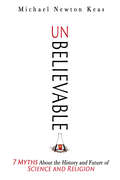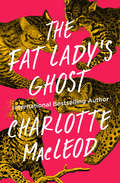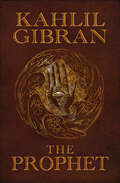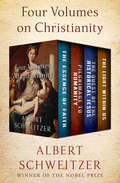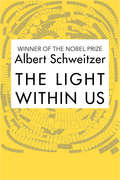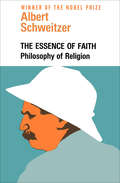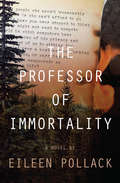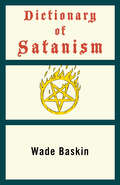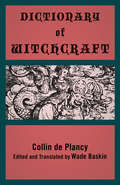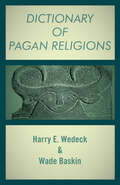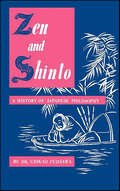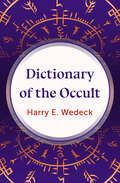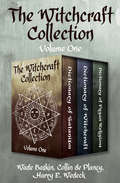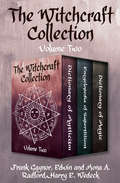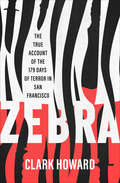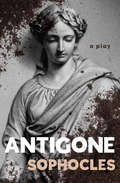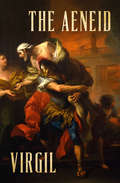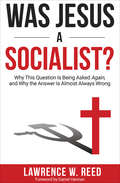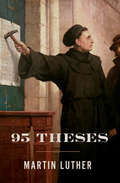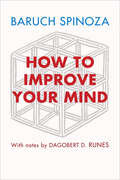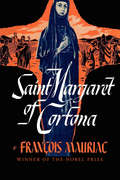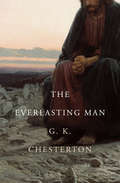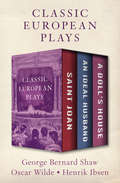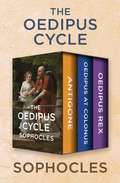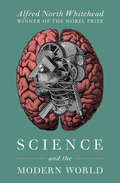- Table View
- List View
Unbelievable: 7 Myths About the History and Future of Science and Religion
by Michael Newton KeasUnbelievable explodes seven of the most popular and pernicious myths about science and religion. Michael Newton Keas, a historian of science, lays out the facts to show how far the conventional wisdom departs from reality. He also shows how these myths have proliferated over the past four centuries and exert so much influence today, infiltrating science textbooks and popular culture. The seven myths, Keas shows, amount to little more than religion bashing—especially Christianity bashing.Unbelievable reveals: · Why the “Dark Ages” never happened · Why we didn’t need Christopher Columbus to prove the earth was round · Why Copernicus would be shocked to learn that he supposedly demoted humans from the center of the universe · What everyone gets wrong about Galileo’s clash with the Church, and why it matters today · Why the vastness of the universe does not deal a blow to religious belief in human significance · How the popular account of Giordano Bruno as a “martyr for science” ignores the fact that he was executed for theological reasons, not scientific ones · How a new myth is being positioned to replace religion—a futuristic myth that sounds scientific but isn’t In debunking these myths, Keas shows that the real history is much more interesting than the common narrative of religion at war with science. This accessible and entertaining book offers an invaluable resource to students, scholars, teachers, homeschoolers, and religious believers tired of being portrayed as anti-intellectual and anti-science.
The Fat Lady's Ghost
by Charlotte MacLeodA young art student catches a thief—and finds her soul mate—in this charming, early YA novel from the million-selling “mistress of the ‘cozy’ mystery” (Los Angeles Times). Possessed of cool common sense and burning ambition, nineteen-year-old Corin Johansen leaves home to attend a prestigious art school in Boston. But Corin never met anyone back in Proctor’s Crossing, Pennsylvania, like the larger-than-life landlady at her new boardinghouse. A former circus star known as Daring Dina who trained lions and leopards under the big top, Madame Despau-Davy now contents herself with teaching her four beloved pet ocelots tricks in the kitchen. Corin soon learns the boardinghouse kitchen is supposedly haunted by the ghost of the Fat Lady from the circus, Dina’s old friend Rosie Garside. Corin is skeptical, but when she cooks, she can’t shake the feeling she’s being watched. The tall redhead has also caught the eye of some of the young male boarders: playboy Jack Banks and standoffish but gifted art student Alex Bodmin. When Corin discovers jewelry hidden in the haunted kitchen and hears the real story of how Rosie met her demise, she begins to suspect one of them may be a jewel thief—and possibly a murderer.
The Prophet: Large Print (Clydesdale Classics Ser.)
by Kahlil GibranRich in timeless wisdom and beautiful poetic language, this spiritual classic is &“exquisite . . . simply a masterpiece&” (The Independent, London). As the wise man Almustafa prepares to leave the island where he has lived in exile from his home for twelve years, the community gathers around him, beseeching him to share his wisdom before he departs. Within this framework, the beloved prophet offers meditations on love, marriage, children, giving, eating and drinking, work, joy and sorrow, houses, clothes, buying and selling, crime and punishment, laws, freedom, reason and passion, pain, self-knowledge, teaching, friendship, talking, time, good and evil, prayer, pleasure, beauty, religion, and death. Written by a Lebanese-American poet, The Prophet was an immediate success upon its publication in 1923. Translated into more than one hundred languages and selling millions of copies, the book&’s popularity has never waned. In the 1960s, it was freshly discovered and venerated by the counterculture, and in 2014, it was adapted into an animated film. The universal truths embedded in these twenty-six prose poems continue to resonate for spiritual seekers. This ebook has been professionally proofread to ensure accuracy and readability on all devices.
Four Volumes on Christianity: The Essence of Faith, Pilgrimage to Humanity, The Quest of the Historical Jesus, and The Light Within Us
by Albert SchweitzerFour of the Nobel Peace Prize–winning author&’s most influential, insightful, and inspiring works on theology and ethics in the modern world. Famous for founding the Albert Schweitzer Hospital in what is now the West African country of Gabon, Albert Schweitzer&’s ethical philosophy of &“Reverence for Life&” became one of the most influential ideas of the twentieth century. These four volumes chart the development of Schweitzer&’s philosophy from his student days to his career as a globally revered intellectual. The Essence of Faith: While studying for his PhD at the Sorbonne, Schweitzer developed his views on theology through an analysis of Immanuel Kant&’s philosophy of religion. In The Essence of Faith, Schweitzer explores Kantian ideas to arrive at an inspiring meditation on God, faith, and the limits of human understanding. Pilgrimage to Humanity: In Pilgrimage to Humanity, Schweitzer discusses his philosophy, his ministry in Africa, and his pursuit of world peace. He also explores the important contributions to civilization made by figures such as Johann Wolfgang von Goethe, J. S. Bach, and Jesus of Nazareth. The Quest of the Historical Jesus: In this landmark work of Biblical criticism, Schweitzer deconstructs the traditional myths of Jesus&’s life by offering rigorous textual analysis and historical evidence. By establishing the social and political climate of Jesus&’s time, Schweitzer not only dismantles the previously dominant images of Jesus, but also presents a compelling new theory of his own. The Light Within Us: In The Light Within Us, Schweitzer&’s longtime friend Richard Kik has compiled many of his most insightful and inspiring quotations. Drawn from his many writings, these quotations share Schweitzer&’s thoughts on service, gratitude, God, missionary work, and much more.
The Light Within Us: The Essence Of Faith, Pilgrimage To Humanity, The Quest Of The Historical Jesus, And The Light Within Us (Paperback Ser.)
by Albert SchweitzerThe classic collection of timeless quotations from the Nobel Peace Prize–winning missionary, theologian, and international bestselling author. Famous for founding the Albert Schweitzer Hospital in Lambaréné, in what is now the West African country of Gabon, Albert Schweitzer was an accomplished theologian, physician, philosopher, music scholar, international bestselling author, and even a virtuoso organist. His many pursuits and achievements were inspired by his ethical philosophy of &“Reverence for Life,&” which he wrote about extensively in his many books and articles. In The Light Within Us, Schweitzer&’s longtime friend Richard Kik has compiled many of his most insightful and inspiring quotations. Drawn from his many writings, these quotations share Schweitzer&’s thoughts on service, gratitude, God, missionary work, and much more. A wonderful introduction to the breadth of Schweitzer&’s thought, this slim volume contains an abundance of wisdom.
The Essence of Faith: Philosophy of Religion
by Albert SchweitzerThe Nobel Peace Prize–winning doctor, theologian, and missionary explores the essence of faith in this masterful early work on Kantian metaphysics. Famous for his medical missionary work in what is now the West African country of Gabon, Albert Schweitzer was an accomplished theologian, philosopher, and international bestselling author. While studying for his PhD at the Sorbonne, Schweitzer developed his views on theology through an analysis of Immanuel Kant&’s philosophy of religion. In The Essence of Faith, Schweitzer explores Kantian ideas to arrive at an inspiring meditation on God, faith, and the limits of human understanding. Both an accessible introduction to Schweitzer&’s theology and a strikingly original approach to Kant&’s writing and thought, The Essence of Faith is a slim volume of profound ideas.
The Professor of Immortality: A Novel
by Eileen Pollack“A tragicomedy about the paradoxes of trying to be a decent human, and—maybe even trickier—of trying to be a decent mom” by the author of A Perfect Life (Rivka Galchen, author of Little Labors). Professor Maxine Sayers once found her personal and professional life so fulfilling that she founded the Institute for Future Studies, a program dedicated to studying the effects of technology on our culture and finding ways to prolong human life. But when her beloved husband dies, she is so devastated she can barely get out of bed. To make matters worse, her son, Zach, abruptly quit his job in Silicon Valley and has been out of contact for seven months. But Maxine is jolted from her grief by her sudden realization that a favorite former student (and a former close friend of her son) might be a terrorist called the Technobomber and that Zach might either be involved in or has become a victim of this extremist’s bombing. Deserting her teaching responsibilities, her ailing mother, and an appealing suitor, Maxine is compelled to set out in search of her son in order to warn and protect him—even though she knows she should report her suspicions to the FBI to prevent greater carnage. “The Professor of Immortality is intimate and sweeping, funny and terrifying, and most of all dead-on in its observations of what it means to want to know everything about people we love while still being frightened of what we might find out: it’s a detective story, and a story of motherlove. Eileen Pollack is a splendid writer.” —Elizabeth McCracken, author of Bowlaway “In this exceptional novel, Eileen Pollack writes with great immediacy about the impact of grief on a parent’s perception of the world. Tender, wry, full of unexpected revelations, The Professor of Immortality gripped me from the first scene, and the urgent questions it poses have stayed with me.” —Idra Novey, author of Those Who Knew
Dictionary of Satanism: Dictionary Of Satanism, Dictionary Of Witchcraft, And Dictionary Of Pagan Religions
by Wade BaskinA comprehensive A-to-Z reference guide to the terms, concepts, influential figures, and key events associated with Satanism. Dictionary of Satanism is a concise yet wide-ranging reference guide for the casual reader or student of satanic practices. It features essential information on the important concepts, issues, people, places, and events associated with Satanism, as well as the myriad forms and names that satanic worship has taken from ancient times to the present. Author Wade Baskin also covers a host of unorthodox beliefs and irrational acts, such as the murder of Sharon Tate. Distilled from hundreds of reliable sources, both religious and secular, the entries include men and movements, orders and objects, rites, rituals, incantations, legends, and occult practices that have fascinated the mind of man through the ages.
Dictionary of Witchcraft: Dictionary Of Satanism, Dictionary Of Witchcraft, And Dictionary Of Pagan Religions
by Collin de PlancyThe original and authoritative A-to-Z reference guide to witchcraft, paganism, and magic, compiled by the famed nineteenth-century French occultist. Following its original publication in 1818, Collin de Plancy&’s Dictionnaire Infernal became a landmark study of witchcraft, pagan religions, and the occult. The first reference work to seriously document manifestations, magic, and superstitions, this historical dictionary details beings, characters, books, deeds, and causes that pertain to the manifestations and magic of trafficking with Hell, as well as divinations, occult sciences, grimoires, marvels, errors, prejudices, traditions, folktales, the various superstitions, and all manner of marvelous, surprising, mysterious, and supernatural beliefs. A significant influence on the Romantic literary movement and notably consulted by author Victor Hugo, it remains an essential text for any student of the dark arts or demonology.
Dictionary of Pagan Religions: Dictionary Of Satanism, Dictionary Of Witchcraft, And Dictionary Of Pagan Religions
by Harry E. Wedeck Wade BaskinA comprehensive reference guide to religious cults of the ancient world, with essential information on religious systems, texts, temple sites, and more. Dictionary of Pagan Religions offers a wide-ranging survey of the many religious cults that have flourished around the world from the Stone Age to the present. From Egyptian to Celtic traditions, and Gnosticism to Cabala, coauthors Harry E. Wedeck and Wade Baskin have compiled in-depth information about the rites and rituals associated with these religious systems, as well as their surprisingly significant influence on mainstream theology and philosophy. This authoritative text includes many of the world&’s forgotten religions, with important information about their ideologies, practices, mythologies, and more. Arranged in A-to-Z format, Dictionary of Pagan Religions is an essential reference guide for any student of paganism, polytheism, or ancient religious practices.
Zen and Shinto: A History of Japanese Philosophy
by Dr. Chikao FujisawaThis history of Japanese philosophical traditions underscores the importance of Zen and Shinto to the development of Japanese culture. How do the Japanese talk about their native philosophy, Shinto, so many years after the Western Allies abolished it as a state religion? What is its relationship to Buddhism, and particularly to Zen? How modern can this very ancient creed ever be? These are some of the questions considered in this analytic work by Dr. Chikao Fujisawa, who specializes in the study of traditional Japanese philosophy and its effect on modern society. Fujisawa&’s work is not only a survey of Zen and Shinto, but also an impassioned plea to restore Shinto as the very substance of Japanese life and thought. At the same time, Zen and Shinto offers new insight into the depth and vitality of Japanese culture, demonstrating its remarkable capacity to assimilate foreign thought and ideas, and thus contribute to the world&’s hope for permanent peace.
Dictionary of the Occult: Dictionary Of Mysticism, Encyclopedia Of Superstitions, And Dictionary Of Magic
by Harry E. WedeckA comprehensive reference guide to all things occult, covering a broad range of magic tradition from Babylonian times to the present day. This authoritative reference text by linguist and occult expert Harry E. Wedeck offers a broad understanding of witchcraft, necromancy, paganism, the occult, and many of magic&’s other manifestations. With in-depth information on essential concepts, practices, and vocabulary, Dictionary of the Occult also covers many of the most notable wizards and demonographers. Perhaps the most famous word in all of magic, Abracadabra is in fact a magic formula used in incantations against sickness or ill luck. Black Mass is a mass held in honor of the Devil. Geloscopy is the practice of divination through observing someone&’s laughter. From A-to-Z, Wedeck covers magical names and terms from around the world and down through the ages.
The Witchcraft Collection Volume One: Dictionary of Satanism, Dictionary of Witchcraft, and Dictionary of Pagan Religions
by Wade Baskin Collin de Plancy Harry E. WedeckThree authoritative yet accessible reference books explaining the terms, concepts, histories, and significant personalities of occult systems and practices.Dictionary of Satanism is a concise yet wide-ranging reference guide for the casual reader. It features essential information on the important concepts, issues, people, places, and events associated with Satanism. Also covered are the myriad forms and names that satanic worship has taken from ancient times to the present. Following its original publication in 1818, Collin de Plancy&’s Dictionary of Witchcraft became a landmark study of demonology and the occult. A significant influence on the Romantic literary movement and notably consulted by author Victor Hugo, de Plancy&’s work remains an essential reference text for any student of the dark arts. Dictionary of Pagan Religions offers a wide-ranging survey of the many religious cults that have flourished around the world from the Stone Age to the present. From Egyptian to Celtic traditions and Gnosticism to Cabala, coauthors Harry E. Wedeck and Wade Baskin have compiled information about the rites, rituals, and influences of these religious systems.
The Witchcraft Collection Volume Two: Dictionary of Mysticism, Encyclopedia of Superstitions, and Dictionary of Magic
by Frank Gaynor Edwin Radford Mona A. Radford Harry E. WedeckThree authoritative yet accessible reference books covering the esoteric terms, concepts, and histories of magical practices and mystical thought. Dictionary of Mysticism offers concise definitions for more than 2,200 terms used in a number of mystical traditions and fields of study, including esoteric philosophy, occultism, psychical research, spiritualism, alchemy, astrology, and demonology. It also covers the studies of Buddhism, Brahmanism, Sufism, Lamaism, Zoroastrianism, Theosophy, and Cabbalism. Encyclopedia of Superstitions is a wide-ranging and authoritative reference book that explores the origins and influences of various superstitions from a number of cultural traditions. It contains enlightening information about charms, spells, fairy lore and legend, folk remedies, and customs of birth, marriage, and death. In Dictionary of Magic, occult expert Harry E. Wedeck offers a broad understanding of witchcraft, necromancy, paganism, the occult, and many of magic&’s other manifestations. This A-to-Z reference book provides in-depth information on essential concepts, practices, and vocabulary, and covers many notable wizards and demonographers.
Zebra: The True Account of the 179 Days of Terror in San Francisco
by Clark HowardEdgar Award Finalist: The true story of a string of brutal crimes committed in the name of religious fanaticism and racial hatred in 1970s San Francisco. In the early 1970s, a small band of well-dressed, clean-cut African American men began terrorizing the residents of San Francisco with guns and machetes. Their victims ranged from a teenage Salvation Army cadet to a middle-aged Jordanian grocer to an eighty-one-year-old janitor. The streets became deserted and tourism plunged. It took months before the culprits could be identified, with the help of an informer. They were members of a Black Muslim cult aspiring to earn the title &“Death Angel&” by slaughtering white victims. Combining history and dramatic recreations, this is the &“repellent but riveting&” in-depth story of a horrifying killing spree and the fanatical hatred that drove it—and the SFPD&’s desperate quest to take the culprits down (Kirkus Reviews). &“[Clark Howard&’s] pounding narrative meticulously describes the so-called Zebra killings of 1973–74, when 23 white San Franciscans were murdered or maimed by a group of Black Muslim extremists. In the retelling, the cold jargon of police files leaps starkly to life.&” —Time
Antigone: A Play (The Oedipus Cycle Series #3)
by Sophocles<p>The classic Greek tragedy about a woman who valiantly defies a tyrant to honor her brother and please the gods.<p> <p>When Polynices—a military leaders in Thebes’s civil war—dies on the battlefield, Thebes’s ruler, Creon, decrees that Polynices’s body will lie unburied and left as prey for the vultures. But Antigone, the late warrior’s sister, answers to a higher authority than the state, and breaks the law to follow her conscience and bury her brother with the proper rites.<p> <p>Antigone’s act of civil disobedience urges great upheaval in this timeless play that explores the conflicts that can arise between worldly and divine law, and the questions raised by the idea of individual freedom.<p>
The Aeneid: Selected And Arranged With Brief Notes
by VirgilThe Latin epic poem The Aeneid, which was written between 29 and 19 BC by Virgil, narrates the narrative of Aeneas, a Trojan who fled the collapse of Troy and made his way to Italy, where he eventually settled and became the progenitor of the Romans. It has 9,896 dactylic hexameter lines. The poem's second half describes the Trojans' eventually successful fight against the Latins, under whose name Aeneas and his Trojan followers are destined to be absorbed. The wanderings of Aeneas from Troy to Italy are detailed in the first six of the poem's twelve books. Greco-Roman myth and legend were already familiar with the hero Aeneas because he appeared in the Iliad. The Aeneid was transformed by Virgil from the disjointed tales of Aeneas' wanderings, his hazy connection to the founding of Rome, and his description as a personage of no fixed characteristics other than scrupulous pietas into a compelling founding myth or national epic that connected Rome to the Troyan legends, explained the Punic Wars, exalted traditional Roman virtues, and validated the Julio-Claudian dynasty. One of the best pieces of Latin literature and largely recognized as Virgil's masterpiece is The Aeneid.
Was Jesus a Socialist?: Why This Question Is Being Asked Again, and Why the Answer Is Almost Always Wrong
by Lawrence W ReedEconomist and historian Lawrence W. Reed has been hearing people say &“Jesus was a socialist&” for fifty years. And it has always bothered him. Now he is doing something about it. Reed demolishes the claim that Jesus was a socialist. Jesus called on earthly governments to redistribute wealth? Or centrally plan the economy? Or even impose a welfare state? Hardly. Point by point, Reed answers the claims of socialists and progressives who try to enlist Jesus in their causes. As he reveals, nothing in the New Testament supports their contentions. Was Jesus a Socialist? could not be more timely. Socialism has made a shocking comeback in America. Poll after poll shows that young Americans have a positive image of socialism. In fact, more than half say they would rather live in a socialist country than in a capitalist one. And as socialism has come back into vogue, more and more of its advocates have tried to convince us that Jesus was a socialist. This rhetoric has had an impact. According to a 2016 poll by the Barna Group, Americans think socialism aligns better with Jesus&’s teachings than capitalism does. When respondents were asked which of that year&’s presidential candidates aligned closest to Jesus&’s teachings, a self-proclaimed &“democratic socialist&” came out on top. Sure enough, the same candidate earned more primary votes from under-thirty voters than did the eventual Democratic and Republican nominees combined. And in a 2019 survey, more than seventy percent of millennials said they were likely to vote for a socialist. Was Jesus a Socialist? expands on the immensely popular video of the same name that Reed recorded for Prager University in July 2019. That video has attracted more than four million views online. Ultimately, Reed shows the foolishness of trying to enlist Jesus in any political cause today. He writes: &“While I don&’t believe it is valid to claim that Jesus was a socialist, I also don&’t think it is valid to argue that he was a capitalist. Neither was he a Republican or a Democrat. These are modern-day terms, and to apply any of them to Jesus is to limit him to but a fraction of who he was and what he taught.&”
95 Theses: Sermon On Indulgences And Grace, 95 Theses (Treasures Of The Taylorian: Reformation Pamphlets Ser. #Vol. 2)
by Martin LutherThe sixteenth-century document that changed the course of Christianity. Monk and theology professor Martin Luther found himself in disagreement with the Roman Catholic Church on the subject of indulgences—certificates sold by the Church that promised to spare their owners from punishment for their sins. With his 95 Theses, Luther proposed a debate on the subject, but ultimately, he was excommunicated and the Protestant Reformation began. This is both a religious document and a historical one—a turning point that marked a challenge to papal authority, set off political conflicts and bloody war in Europe, and led to the remarkable variety of Christian denominations and sects that exist in the world today.
How to Improve Your Mind
by Baruch SpinozaThe Enlightenment thinker asserts that mental tranquility is achieved through knowledge of God in this brief philosophical treatise.Seventeenth-century philosopher Baruch Spinoza was one of the most original and important thinkers of his time. His magnum opus, Ethics, influenced generations of great minds from Karl Marx to Ludwig Wittgenstein and George Santayana. In this earlier work, Spinoza articulates his view that life is best lived with the supreme happiness of knowing God&’s infinite love. By extension, all earthly pursuits—including money, fame, and sex—are mere distractions from the greater joy of the soul&’s quietude. This edition of How to Improve Your Mind is translated by the philosopher and founder of the Philosophical Library, Dagobert D. Runes. Runes also provides exclusive commentary and biographical notes.
Saint Margaret of Cortona
by François MauriacThe Nobel Prize–winning author&’s stirring biography of the thirteenth-century Italian penitent who become the patron saint of the homeless. Born in 1247 to a farming family in a small village outside Perugia, Margaret of Cortona was willful and reckless in her youth. At age seventeen, she became a wealthy man&’s mistress—even bearing his son out of wedlock. But her life of sin ended when she found her lover murdered. Devoting herself to prayer and penance, Margaret eventually joined the Third Order of St. Francis and took a vow of poverty. She established a hospital for the poor and homeless at Cortona. On divine command, she challenged her own bishop for his lavish and warlike lifestyle. Canonized by Pope Benedict XIII in 1728, she became a patron saint of the downtrodden, including the falsely accused, homeless, orphaned, and mentally ill, as well as midwives, penitents, single mothers, reformed prostitutes, and third children. For François Mauriac, Saint Margaret of Cortona became a source of fascination and solace during the Nazi occupation of France. During that time, feeling himself and all his countrymen to be among the downtrodden, he wrote this biography.
The Everlasting Man
by G. K. Chesterton&“The best modern argument for Christianity I&’ve ever read . . . Be careful—you might just be converted.&” —Ross Douthat, The Week Philosopher and literary critic, as well as creator of the popular detective Father Brown, G. K. Chesterton takes us on a journey through history and human civilization in this classic work of lay theology, arguing—against the views of some of his contemporaries, H. G. Wells notable among them—that Jesus was simply a historical figure, albeit an extraordinary one, and Christianity is no different than any other religion. A book that had profound influence on C. S. Lewis, author of the Chronicles of Narnia series, The Everlasting Man is considered one of the great modern examples of Christian apologetics.
Classic European Plays: Saint Joan, An Ideal Husband, and A Doll's House
by George Bernard Shaw Oscar Wilde Henrik IbsenThese three timeless plays showcase the sparkling wit and provocative intellect of some of modern drama&’s greatest playwrights.Saint Joan by George Bernard Shaw: This complex drama depicts the life of Joan of Arc—from her childhood vision calling her to lead the French army against the English in the Hundred Years War through her eventual capture, trial, and burning at the stake. An epilogue depicts a retrial that clears Joan of heresy, declaring her a Christian martyr.An Ideal Husband by Oscar Wilde: In this timeless drawing room comedy, a blackmail scheme forces a married couple to reexamine their moral standards—providing a wry commentary on the hypocrisy of politicians. Carried along by nonstop witty repartee, this is satirical theater at its finest.A Doll&’s House by Henrik Ibsen: This quintessential work of dramatic realism depicts one woman&’s struggle against patriarchal society. The central character&’s rejection of a smothering marriage shocked theatergoers of the late nineteenth century while the play&’s pioneering style set the stage for twentieth century domestic drama.
The Oedipus Cycle: Antigone, Oedipus at Colonus, and Oedipus Rex (The Oedipus Cycle #1)
by SophoclesThe doomed king of Thebes brings shame on his family in this iconic three-play cycle of ancient Greek literature, a foundational work of Western drama. Oedipus Rex: As a young man, Oedipus was told of a prophecy that he would kill his father and marry his mother. Fleeing his home to escape his destiny, he becomes the king of Thebes by marrying the former king&’s widow. But now Thebes is cursed until Oedipus discovers who killed his predecessor—a mystery that will lead him to his own doom. Oedipus at Colonus: Blind and exiled from his own country, Oedipus takes up residence in Colonus while his two sons battle for the throne of Thebes. An oracle has pronounced that the location of their disgraced father&’s final resting place will determine which of them will win. But an old enemy has his own plans for the burial. Antigone: The war is over and Thebes&’s ruler, Creon, decrees that the body of Polynices—Oedipus&’s son—is not to be buried. But Antigone, the late warrior&’s sister, answers to a higher authority. When she breaks the law to bury her brother with proper rites, her act of civil disobedience will unleash great upheaval.
Science and the Modern World: Lowell Lectures, 1925
by Alfred North WhiteheadThe famed mathematician and philosopher takes readers on a journey into a new scientific age, exploring topics from relativity to religion. Alfred North Whitehead, one of the great figures in the philosophy of science, wrote this prescient work nearly a century ago. Yet, in an era that has us reckoning with science and technology&’s place and meaning in our lives, it remains as relevant as ever. Science and the Modern World puts scientific discovery into historical and cultural context—exploring the effects of science and people on each other. &“It is a work not only of the first importance but also of great beauty. . . . Vivid writing.&” —Nature
